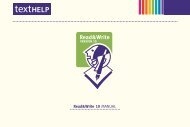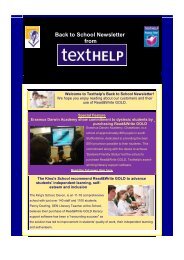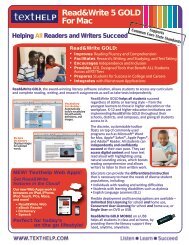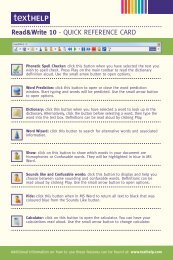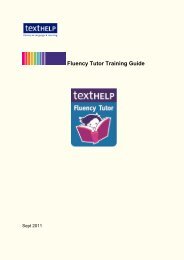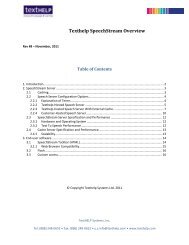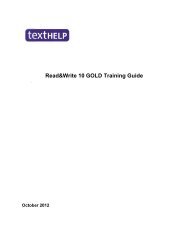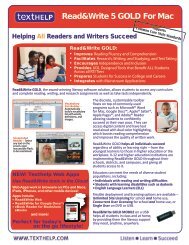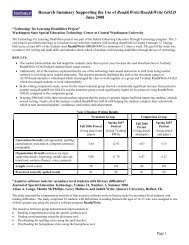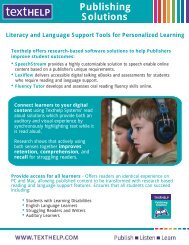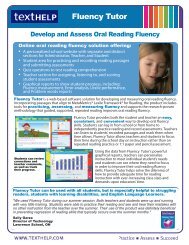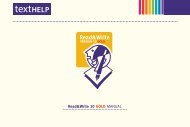01 NRDC Dyslexia 1-88 update - Texthelp
01 NRDC Dyslexia 1-88 update - Texthelp
01 NRDC Dyslexia 1-88 update - Texthelp
You also want an ePaper? Increase the reach of your titles
YUMPU automatically turns print PDFs into web optimized ePapers that Google loves.
Developmental dyslexia in adults: a research review 47<br />
The reciprocal relationship between phonological awareness and reading ability<br />
Phonological awareness clearly influences the acquisition of alphabetic skills. Is it true, as we<br />
might assume, that this influence travels in a single direction? Evidence suggests that the<br />
relationship is interactive, in that early phonological skills are crucial in learning to read<br />
(Goswami & Bryant, 1990; Rayner et al., 20<strong>01</strong>), while learning to read in an alphabetic system<br />
enhances phonological awareness (Morais et al., 1987); and similarly, phonemic awareness<br />
assists learning to spell (Caravolas et al., 20<strong>01</strong>), while learning to spell enhances phonemic<br />
awareness (Ventura et al., 20<strong>01</strong>). The relationship between phonological awareness and<br />
reading ability thus involves reciprocal causation (Korkman et al., 1999; Snowling et al.,<br />
1996b; Tunmer & Chapman, 1996).<br />
However, a pattern of interaction between reading ability and phonological awareness is not<br />
inevitable. People may learn to read without fully grasping the fundamental structure of the<br />
writing system (Byrne, 1998), in which case their reading ability could depend more on sightword<br />
recognition and contextual clues than upon the decoding skills associated with<br />
phonological awareness. Such readers will have no difficulty in reading either regular or<br />
irregular words so long as these words are familiar, but they will have difficulty with<br />
pseudowords and unfamiliar real words. While spelling can be learned implicitly through<br />
exposure to print (Bryant, 2002), learning to read is usefully supplemented by explicit<br />
instruction in spelling (Caravolas et al., 20<strong>01</strong>; Viise, 1996).<br />
The identification of unfamiliar words by playing ‘psycholinguistic guessing games’ (Goodman,<br />
1970) is seldom a viable alternative to decoding: context may help (Archer & Bryant, 20<strong>01</strong>) and<br />
it may be especially useful to readers with low levels of literacy skill (Snowling, 1996), but it<br />
depends on existing semantic and syntactic knowledge (Rego & Bryant, 1993) and accurate<br />
guessing may require a high level of predictiveness in the word to be guessed at (Gough &<br />
Wren, 1999). For less skilled readers, psycholinguistic guessing games are inadequate, both<br />
because there is an extraordinary number of synonyms or near-synonyms in English and also<br />
because successful prediction is possible only where the predicted word violates the basic<br />
communicative convention of conveying non-redundant information. Natural language does<br />
have a built-in level of redundancy (sufficient to infer what is said against a background of<br />
some noise and what is written when text has been to an extent degraded), but this level is<br />
almost always too low to predict individual words uniquely.<br />
Although early research suggested that skilled readers recognise words without noticing the<br />
letters that compose them (Huey, 1908), we now know that this is not so (Rayner, 1998;<br />
Reichle et al., in press); if it were so, then proof-reading would be impassible—as readers<br />
now see. Psycholinguistic guessing games are at best an emergency strategy; they are not a<br />
substitute for learning about the alphabetic principle (Chapman et al., 20<strong>01</strong>; Liberman &<br />
Liberman, 1992). Moreover, reliance on conscious predictions from context in word reading<br />
may reduce available working memory capacity and thus impair comprehension (Bruck,<br />
1998). The routine use of context as a strategy to compensate for poor decoding skills may<br />
well lead to future reading difficulties (Liberman & Liberman, 1992; Nicholson et al., 1991).<br />
Learning to read and write in an alphabetic system helps and is helped by, the development<br />
of phonemic awareness.



